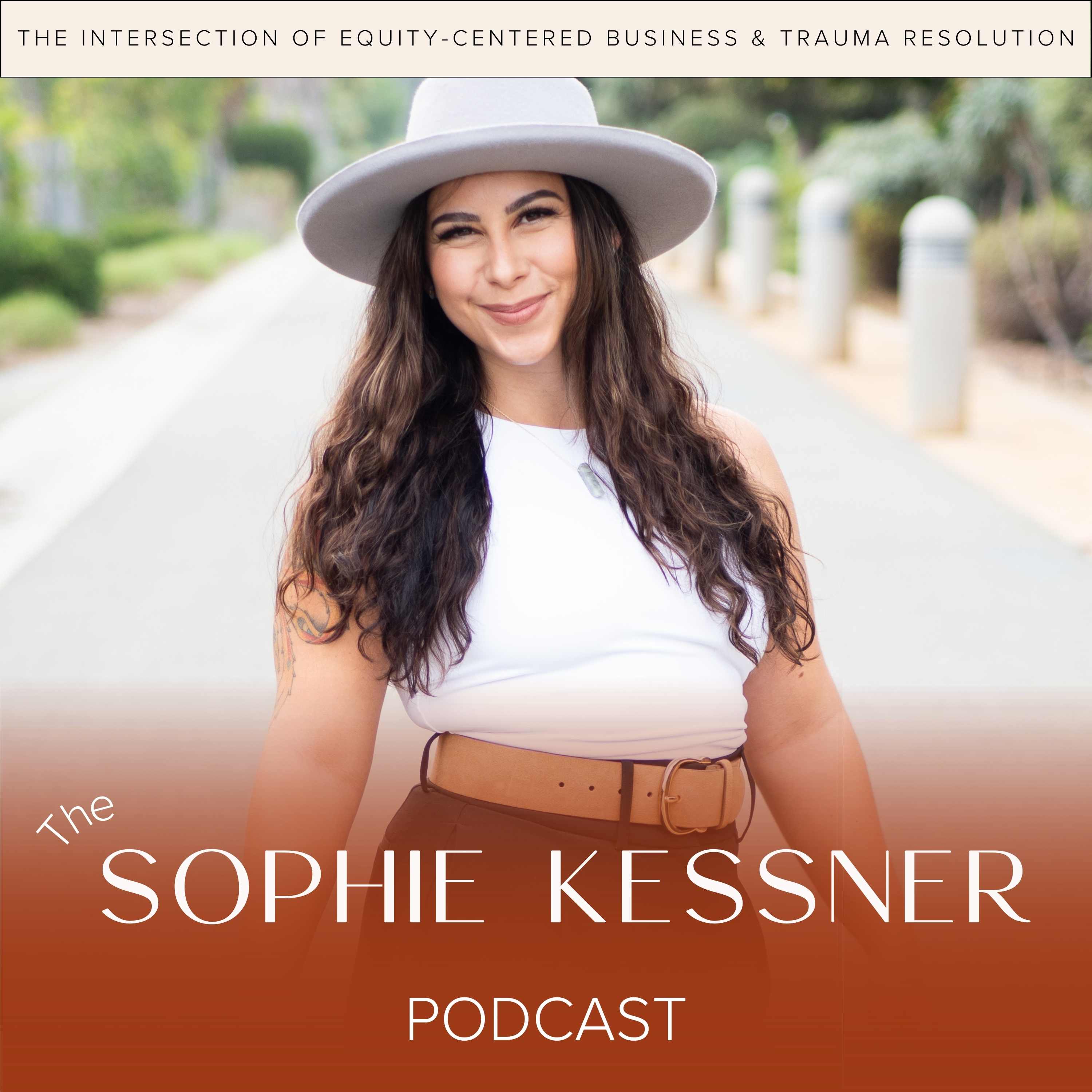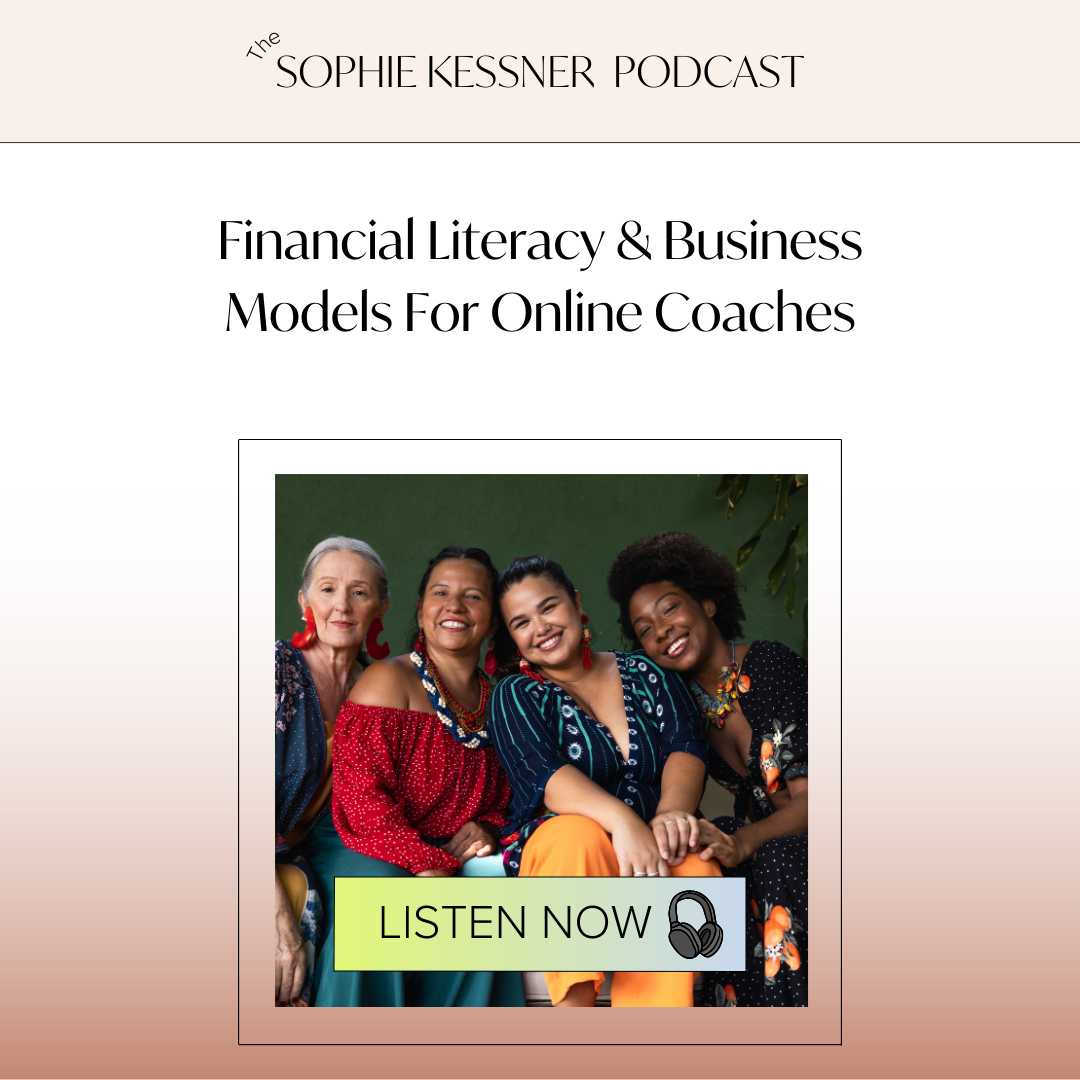Episode Transcript
Speaker 0 00:00:00 Welcome back to the Sophie Kesner podcast. I am your host, you guested, you can call me. So I just realized that that is me totally playing off of. If you haven't seen the Food Guy on TikTok, I don't remember his name, but his account is fucking hilarious. Anyways, welcome back. Welcome back, welcome back. So we've been on a fun little series, the last few episodes talking about transitions and pivots and shifts in the business and making these big, hard, heavy, scary decisions. Uh, and I wanna continue on that. Uh, but I wanna continue from a little bit of a different, different lens, uh, or just a different angle, I should say, when you're in this space and this place. So, what I want to dive into next is the, the personal component of this process. Now we, we've spent a lot of time talking about practicality, talking about where we are in places, what, what's happening in the business, how to make sure we're financially secure and stable.
Speaker 0 00:00:52 And if you haven't listened to the previous episodes, please come back and do that, cuz that's a pretty important, um, but in, in this process, what I wanna explore is the personal piece is how are we meeting our own needs and how are we taking care of ourselves? And how are we making sure that we're good so that we're not 110% reliant on our business to do everything for us? Because that, I think, can be the biggest trap of all, is when we build something for ourselves, like our business that is meant to make us happy. It's meant to be our sense of full expression, connection, intimacy, vulnerability. And on top of all of that brings in a sense of purpose and meaning and financial stability to where we feel so deeply intertwined with our business. Now, they've talked about this before in other episodes, um, but what I really want to hone in on in this one is reconciling with what is the purpose of the business and who are you outside of the business?
Speaker 0 00:01:45 And this is a question I've been asking myself for years now at this point, going on a decade, uh, of, of who am I when I'm not in the business? Who am I when I'm not coaching, when I'm not consulting, when I'm not mentoring, when I'm not doing the things? And I, I really do believe that this is such an important conversation that is so overlooked, uh, or overlooked and underappreciated because it's easy, it's easy to, to not think about this, to not talk about this because it feels so damn good to be somebody who is doing something that feels meaningful and feels like it's impactful and feels like it's making a difference. And <laugh>, I laugh about this, um, kind of ironically, but, but I'll, I'll give you the full context because hey, we're friends. <laugh>, you're hearing you're listening to this. We're friends.
Speaker 0 00:02:28 You're getting to know me probably better than, uh, most, most people <laugh> in my world, unless you have my personal number. Uh, in which case we are probably texting all the time about all of the things. But, uh, if you're on this podcast, you're listening, let's, let's kind of explore this a little bit. So it's on Facebook recently, uh, I don't really post on there, but every once in a while I'll find myself on a scroll hole. Uh, and usually I'm on Facebook marketplace looking for fun things that I can go in thrift. Uh, but every once in a while I'll just pop on and look at the feed real quick. And it was funny because I saw an old colleague of mine sharing about how some of these really, really big folks who, you know, make really like a ton of money, ton of money in the product based space.
Speaker 0 00:03:05 And then we're talking about products like plungers, products like brooms, <laugh> products like gardening, hoses. These are the businesses that they've built. And I was cackling to myself when I read this, and they were saying like, these people don't care about the, the flaunt of it. They don't care about the clout, they don't care about any of it. Like, they're not trying to put their name on it on a plunder. They're not trying to put their name behind this thing. They're just want a business that makes money, that brings in revenue. And I, I find that really interesting because I, I think in, in the personal development, online transformation space, Instagram influencer space, there's such a, such an overplayed paradigm of, you know, you have to step into your purpose and your power and transform the world and chip paradigms and all the things. And I, you know, not to mock any of that by any means because I've definitely had my fair share in, in these spaces and places.
Speaker 0 00:03:53 But more so to really speak into what is the business doing for you? Because I think when we're looking at making shifts and pivots and transitions in our business, sometimes we're not necessarily making them from the most rooted spaces. And again, uh, this isn't to criticize anybody in the way that they approach anything. This isn't to say that you're bad or wrong if you do any of these things. I am just providing perspective and opinion here. Uh, and that's not to say that it is right, wrong are the only one, but it is what I like to share. So, with that being said, a lot of the times, the, the, the traps that we can get caught in are, are a few different things. And I'll, I'll try and set how I wanna approach this, but I, I think the way that I'll approach it is through a little bit more of a trauma lens.
Speaker 0 00:04:33 Um, depending on our upbringing and how we belong in community or how we've adapted to belong in the community and spaces, we play out those patterns in life and especially in our business. Now, a lot of the times we'll see folks like myself who, uh, grew up with a lot of disorganization and change, like constant change. Like we're talking every year from sixth grade until I graduated high school, I went to a different school every single year, I don't know, stability or consistency very well, <laugh>. And I also rearranged my entire house constantly, like constantly have to change rooms and move furniture around and make it look like a brand new room because I cannot stand things being the same for too long. This has been such an issue for me in business because I have to look for things outside of my business to constantly make changes in so that I'm not constantly changing my business.
Speaker 0 00:05:22 Because what I what happened early on in, in my career was every three months, every six months, I'd be wanting to change everything and not just like one little thing, everything <laugh>. Uh, and, and though there were times yes, where that might have been appropriate, it wasn't always the best thing for me to be doing because I'd be making a hard left and then a hard right. And we see this a lot in the, in the industry and in the space where people one year will be in one completely different place and then the next year they're in the complete counter opposite. And again, not to say that this is bad or wrong, but it's important to recognize like, oh, okay, that's an interesting pattern. Now, another pattern in the side of this
Speaker 1 00:05:56 Process is folks who feel like they need to perform to, uh, fit into communities or spaces, folks that feel like they need to make everybody else around them happy, feel comfortable, feel safe, feel whatever it is, so that they can feel sense of belonging. And oftentimes this pattern can show up in the sense of looking to see whoever you invest in, uh, as far as like a mentor or coaching program or whoever you're friends with. And then feeling this need to be the perfect type of student to need, to be the perfect type of client, to need, to be the perfect type of coach or consultant or whatever it is you do. And doing everything <laugh>, uh, in the position of trying to do it for the other person to make them feel better so that you feel better, right? It, it's a sense of managing.
Speaker 1 00:06:34 So we, we manage other people's emotions by chameleon ourselves to make them feel better so that we feel better because we don't feel comfortable when other people feel uncomfortable. And that's an interesting pattern in business as well because we're doing a similar thing. We're constantly changing and adapting and shifting and contorting and, uh, never really having a, a sense of self or stability or consistency in it either. And that can be incredibly problematic. Another interesting pattern that we'll see is folks who tend to have a lot of resistance, right? Um, this can kind of be in the perfectionist realm, but it's the folks who don't wanna get anything wrong, they don't wanna mess up, they wanna have it perfect, they wanna have a perfect plan. They gotta have it all figured out. They have to know how to do it. They have to have absolute certainty about it.
Speaker 1 00:07:15 But then nothing ever gets started, nothing ever gets done, enough's ever good enough. Uh, and if something happens, then it's, feels like the whole world is falling apart and there's a lack of capacity to deal with the discomfort of things not being the way that you want them to be. So there's an obsession and a hyper fixation on trying to make things exactly the way that you want and predict and prevent any potential, uh, things not going the way that you want them to do. So a sense of controlling it, right? It's such a tight grip on control. Yeah. And <laugh> in business, this can show up in a similar way, right? You're, you're griping so hard, having the perfect copy, the perfect program, the perfect sales page, it's the perfect content and nothing actually gets done. Nothing actually gets produced. You spend years, years and years trying to create one thing when so many other people have passed you in the game who've put in so much less effort with so much less experience, seemingly, and they are so much further ahead, and you're like, what the hell, man?
Speaker 1 00:08:04 Like, I care so much more. I have so much more experience, but yet here I am spinning my wheels trying to perfect this thing. So again, these are patterns. Uh, and it's not to say that you're one or that you're all, or you could be a total mixed bag. You can oscillate between different ones, different seasons. You might have been one four and now you're another one, or you've got like different flavors of it. But these, and there's so many more to this as well. Let me just add that caveat. There are so many other flavors and, and ways in which personality types, upbringings, experiences, responses, survival strategies will show up in our lives and then play out in our businesses. But I bring this up because in the conversation of transitions and pivots, we have to start to acknowledge how what we do naturally because of who we are and the lived experience that we've heard plays out in the business.
Speaker 1 00:08:48 For me, my medicine is different than somebody else's medicine. And what do I mean when I say that? Because my system is naturally very disorganized. My, my upbringing was incredibly chaotic and disorganized and constantly changing. I've, I've learned how to be adaptable and I thrive in the face of an adversity, for sure, hands down, no problem, right? I can adapt, I can shift, I can do all of the things, but ask me to stay consistent with something for an extended period of time and I will cringe, which is so hard, it is so challenging. So my medicine is consistency. It's sticking with something and moving with the boredom, getting, learning how to be comfortable with boredom, learning how to be comfortable with stability, learning how to be comfortable with consistency even when it doesn't have like fireworks and all of the other things. Because though that feels comforting to me, right?
Speaker 1 00:09:35 The fireworks, the change, the intensity of it, it's not necessarily what's most supportive for the business. So I cannot be seeking out to get those needs met in the business. So what do I do instead? I change my furniture every single week. I rearrange the room, I rearrange the house. My partner really appreciates <laugh>. They never know what they're gonna get. Uh, and I love about this, you know, side note because every time I'm like, I like it so much better like this. And this most recent time, they were like, yeah, I'm sure you do <laugh> until you change it in two weeks.
Speaker 1 00:10:09 I was like, oh my God, stop it. <laugh> don't, don't hate all my processing strategies. But for me, that that's how I, I take that energy that needs that constant shift and change, and I put it into something that's not necessarily going to disrupt the flow that's happening in the business. Because oftentimes when I'm feeling bored, when I'm feeling uneasy, when I'm feeling dissatisfied in the business, it's very rarely actually about the business itself. It's usually about something that's happening in my personal life or just in my system, whether I'm in a deep process of, of, um, processing. And what I mean when I say that is I, I've been, uh, pretty deep in the pit when it comes to trauma work for the last three-ish years. Three going on four years now. Um, and inside of that trauma work, I'm constantly doing things when it comes to processing, right?
Speaker 1 00:10:52 Sitting down, lending my system to other people who are in the programs with me. And we are practicing on each other and practicing on our trauma and receiving sessions and going to consultations. So my shit is always at the forefront of everything. And over the years, I've had to learn not to be making decisions from this place. And so what that's meant, because I've been on a constant path making, doing all of this work while being in the place of making decisions, is not making decisions in the moment. <laugh>, when I'm thinking about doing something, I sit with it and I sit with it for a little bit longer and I say, okay, let me come back to this. Let me, I'm noting this down for myself that this is how I'm feeling and let me see if I'm consistently feeling this way over an extended period of time for at least one or two months before I decide to move forward with this. Because is this just a temporary feeling based off of this thing that I'm processing? Or is this really a big thing? Now? In one of the previous episodes, I talked a little bit about my pm d d, um, my premenstrual dysphoric disorder, which is essentially a hormonal thing where every month right before my period, I have all of these intense emotions and everything is amplified. I don't make decisions in that place. <laugh>. Um, I,
Speaker 2 00:11:52 I, from what I understand, again, not a hormone expert, but from what I understand, um, I think every woman goes through those fluctuations and right before their period, they tend to be a lot more emotional and, and just have like a lot more intense emotions. Uh, and then it's just exacerbated when you're on that spectrum for pmm, d d. So back to my, uh, point here from my personality type, my medicine is to sit, to wait to be with it, to contemplate. And, and when I'm feeling that constant urge to make changes in my business, I don't, I don't do it right away. I put it into something else, something that's, you know, not, not as risky or going to be life altering, um, by just altering my furniture or altering whatever it is or putting it into something. And then I come back to it.
Speaker 2 00:12:29 Now, that solution isn't the solution for every person. You take somebody who's the counter type. So the person who's more in that perfectionist category, who's trying to get the thing perfect and can't move forward until they've prevented and predicted every single possible outcome, that's not the medicine for them. The medicine then for them is gonna be the complete opposite. It's going to be looking at, okay, how do we start to actually move it forward and build resilience to have little failures and to have little mistakes and to recognize like, okay, great, didn't work out quite the way you wanted. That's okay. Look, you're still alive, you're still here. Let's continue to build that muscle. So the, the protocol, the medicine, the solution, the this process that you would provide for a person would be completely different dependent on what their upbringing is, depending on what their patterns are, how their system operates.
Speaker 2 00:13:12 And I think this is probably one of the biggest challenges when we're talking about change in the online space, is we get given, uh, blanket statements, right? We get given frameworks and blueprints or whatever it is that are built for a specific type of person. And oftentimes they're built for the person that made them <laugh>. And if you're similar to that person, they work very well for you. But if your system, like, if the way that you process and your patterns are counter or different or not the same as the person who created it, then oftentimes it doesn't have the same effect. It doesn't work the same way. You have different match points, different resistance points, and you don't seem the same level of growth or success with it. And that's where we start to run into issues, into problems. So that is where we, we have to take the time to really get to know ourselves.
Speaker 2 00:13:54 Now, not do a flaunt here, but <laugh>, I, uh, I was fortunate enough in, in the chaoticness of my upbringing to be placed in a, in a youth camp. And I was exposed to the personal development space pretty early on. I was about 12, 13 years old. Um, at the time of this recording, I'm just about to hit 28. So about 15 years, 15 years with exposure to the personal development world, which is a long time. And so mindset work, changing our beliefs, all of that stuff is just so deeply ingrained in my system. But over the last three years, like I'm very early on when it comes to trauma work, yes, I've been studying intensely for the last three, four years, but some of these folks have been doing this for longer than I've been alive, <laugh>. And I look at that and I'm like, wow, I've got a long way to go. And I bring this up because when I say getting to know ourselves, I think a lot of the times we have a superficial idea of who we think we are and our relationship to ourselves and how we know ourselves, which isn't necessarily the full picture, right? We have a, a sense
Speaker 3 00:14:50 Of what we think we know about ourselves, what we think we feel about ourselves, how we think we show up in the world. Now we think we respond. And a lot of the time in those early years, we don't really actually understand it, right? We kind of just know, oh, I'm this way, or that's just the pattern, or that's just how I show up. But in actuality and in, in, in the depth of it, there's so much more underneath it. And we can start to reconcile with the shifts and the changes that we can make now, different approaches to healing and to change and to transformation work differently for different people and different problems. I don't believe that there's a one size fits all, and I don't believe that there's like the, the one thing that's the solution for everybody. That's just not the reality.
Speaker 3 00:15:25 So it's important to discern for yourself what actually works for me? What am I susceptible to? What, what makes the difference in the way that I approach my life, my business, my identity, who I am, how I feel. For some folks, mindset work isn't is enough right there. There's not a whole lot of deep trauma there that they're needing to unpack and unwind for other folks. They need the deeper work. They need to go into some more, uh, personalized, intimate staff where they really get vulnerable. Now, that might be mdr, that might be trauma resolution work through somatics. That might be just regular talk therapy. That might be called cognitive behavioral therapy. That might be other things. But it's figuring out for yourself what is actually gonna be the tool or the process to support you as you go through this process of self-discovery and self-exploration.
Speaker 3 00:16:05 How are you going to continue to support yourself inside of that process so that you can really get to know what your patterns are? Now, if pattern recognition is something that I'm just naturally gifted at it, it's just one of my innate skills, it's always has been a very patterned, system oriented type of person. And for me, it's easy to pick up on patterns, especially in other people. Uh, and myself, it's a little more challenging cause I have blind spots. But in others, in systems, I can see it pretty quickly. And that's just the way my brain works. Now for yourself, if you're not this way, uh, you can look back and you can look at what has happened. You can start to see what the trends are, what the patterns are for you. And I think that's important that we, that we do look back, we look to see what is the history with us?
Speaker 3 00:16:43 What are the patterns that we run? And then how can we start to make shifts and changes to support a different approach? And it's important in this process to recognize as you are making change changes and pivots and shifts, but they're not always going to feel comfortable, are familiar. And the reality is that sometimes the things that are gonna be the biggest changes and shifts are gonna feel the most uncomfortable because they're going to require us to do something very different than what we're used to. Chaos and disorganization and constant change is normal for me. Like I love that and I thrive in them. And so consistency, stability feels very uncomfortable in the last thing that I wanna do. But it is the most supportive thing that I can do for myself and for my system because it's creating the thing that I never knew I needed because I never had it when I needed it, right?
Speaker 3 00:17:25 And so inside of your business, it's usually gonna be a similar thing. The thing that you need the most is likely gonna be something that you really don't like, that you really don't want, that bore you to death, that you have so much resistance towards. And that's okay. That might not always be the case. But when we're talking about making big, big changes in who we are, how we feel, how we experience ourselves, how we experience our business, this is what we start to get into. This is what we need to, to look at. Because your business is in, to some degree, an extension of who you are and the way that you run your business, especially if you have a pretty small business, meaning it's just you or a small group of people supporting you, and you're not just running a giant company, then the business is going to be a very big mirror for your patterns.
Speaker 3 00:18:04 It is going to be built through you, which means it's going to be encoded with all of your quirks and patterns and everything else that comes with it because you're the one pulling all of the, the bells and whistles. So it's important that you do spend the time to really get to know yourself, to really get to understand who you are, how you operate, how you run, how you do the things that you do, so that you can search a change the way that you do them. And most importantly, to decide like, is this the kind of business that you wanna be a building? Maybe you don't wanna be a big influencer on Instagram. Maybe you don't wanna have a, a whole personal brand. Maybe you literally just want to have something that makes you money that you don't have to be the, the face of and understanding that that's a possibility that can work for folks. So then it's just figuring out, okay, well what does that actually look like? So that is it for today's episode. Thank y'all for staying with me on this one. I hope you enjoyed it and I'm excited to dive a little bit more into the conversation of patterns, a conversation of all of the processes and the way that these things show up in our lives in our business. I personally really love this conversation. Uh, and so I'm excited to to dive in more. All right, y'all, I will see you on the next episode.






